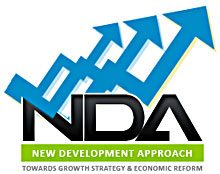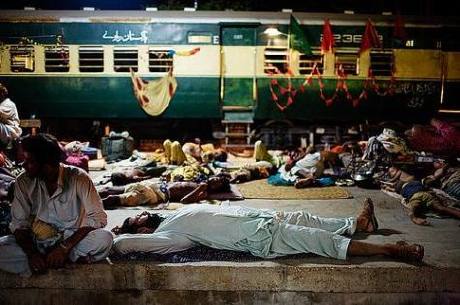 (Editor’s Note: In this, the fourth in a series on Pakistan’s New Growth Strategy – see here and here and here – we discuss a real case of a major enterprise and ask you what needs to be done about it. Given the recent crisis at PIA and ATP’s long interest in Pakistan Railways, this is a specially pertinent case. The Planning Commission of Pakistan has invited ideas and suggestions on this and we invite and encourage our readers to please help in highlighting the best and most innovative ideas they can think of. Have your say.)
(Editor’s Note: In this, the fourth in a series on Pakistan’s New Growth Strategy – see here and here and here – we discuss a real case of a major enterprise and ask you what needs to be done about it. Given the recent crisis at PIA and ATP’s long interest in Pakistan Railways, this is a specially pertinent case. The Planning Commission of Pakistan has invited ideas and suggestions on this and we invite and encourage our readers to please help in highlighting the best and most innovative ideas they can think of. Have your say.)
Railways all over the world have an edge in long-haul and mass-scale transportation of both goods and passengers.
In Pakistan they were the primary mode of transport until the 1970s, but since then their share has declined due to a shift in government focus from rail to road transport. From 2005 to 2010, budgetary expenditure on railways was only Rs45.5bn compared to Rs155bn on the national highways.
But lack of resources is not the only problem. Only 42 per cent of total track length is currently being utilized, and this number is expected to fall even further after the closure of many routes in 2010. So what exactly is happening with the remaining 58 per cent? Most likely it is being sold on the black market or being left to degrade on its own.
We cannot expect Pakistan Railways (PR) to run the few locomotives it has left on all routes, as this is neither economically nor physically feasible. But there is at least one thing it can do without spending a single penny — give up its monopoly and open up tracks to the private sector.
PR is facing significant losses due to mismanagement, over-staffing, underinvestment, poor maintenance and weak ticketing checks that allow people to get away with not paying for their tickets. Over time there have also been political interventions in decision-making about which new routes to open. Furthermore, PR is not allowed to charge a market-clearing price; fares have always been dictated by the federal government.
But we have all heard about these problems time and again. What is more important is to focus on how to make things work, which is what the New Development Approach (NDA) team at the Planning Commission is currently working on.
To improve management, partial privatization should be encouraged. In India this has given the railways sector a much-needed boost. PR can adopt similar measures, such as outsourcing stations management and rail hospitals, allowing companies to run their own container trains, and letting suburban trains run as separate companies. This will increase the private-sector participation necessary for promoting competition.
When outsourcing station management, some percentage share of the revenue from all tickets sold at a particular station should go to management. This would incentivize management to make sure the maximum number of tickets is sold through better provision of services, an efficient ticketing system and minimum free-riding.
Gradually PR should be unbundled and privatized completely. This may include privatising rail tracks, station management (as mentioned earlier) and separating passenger from freight services. Privatising tracks (including signaling), especially, will improve track utilization and minimise the government’s ability to control competition. Furthermore, the earnings of the track operator would be solely dedicated to the maintenance and expansion of track infrastructure. Such unbundling would create a more mature market in the railways sector, which is necessary for efficient allocation of resources and hence for growth.
For successful results, however, two important conditions must be fulfilled. First, an independent regulatory body must be established with sole responsibility for promoting competition and implementing quality control. Currently all regulations are made by the railways’ ministry, which is also the PR’s parent body. Existing financial and administrative linkages between PR and the ministry will never allow the latter to draft policies that do not favor PR. It is also widely accepted in international academic circles that improved private-sector participation and increasing competition results in greater benefits if an independent regulatory body exists.
Second, prices should be deregulated and market players should be given full power to charge a market-clearing price. Had the Pakistan Telecommunication Authority (PTA) not been established and prices not deregulated, we might not have witnessed the boom in the telecom sector.
Furthermore, to reduce corruption within PR, employees should be given performance-based remuneration and promotion. PR employs round 90,000 people and carries on average 65 million people annually. Indian Railways, on the other hand, employs 1.6 million people and carries 7.3 billion people annually. This gives us an annualized passengers-per-employee ratio of 722 for Pakistan Railways and 4,562 for Indian Railways. Given its massive losses, PR needs to better handle its employees and operations. The colonial tradition of seniority-based promotions has long failed and has even been abandoned by the country that propagated it.
The solution, then, is to unbundle railways infrastructure into rail tracks and signalling, station management, and services (passenger and freight). Privatise unbundled assets, especially rail tracks and signalling for increasing track utilisation and station management for making ticketing procedures and checks more effective. This gives us a clear-cut restructuring plan for one of Pakistan’s major state-owned enterprises.
What do you think? Have your say.
(This article was first published in Dawn).






















































rather apologetically I would add my two pence worth; Outsource Pakistan Railway to the Indian Railways to make it efficient and profitable.
ok don’t abuse me now for speaking a bitter truth.
nice idea.. must be appreciated… i also wrote an article on railway. this is here…http://paklifecycle.blogspot.com/2011/02/paki stan-railway-i-solute-you-for.html
Unfortunately privatization of everything is not the solution to all problems despite all the hype around the idea. Privatizing the railways is simply going to destroy whatever is left of it. Huge amounts of assets that railway currently have will be divided up and sold out for personal gain without any benefit to the nation. This is the primary motivation behind many such proposals to privatize government functions and responsibilities. Tracks particularly in those parts of Pakistan which are to the west of Indus will simply disappear without any one noticing it – check out what has been done to the Pishin – Zhob railway line. Does any one think that private companies would build, maintain or upgrade any of this infrastructure? The British built those lines at a time when there was no financial return on them; however, but for these lines built a hundred years ago we would not have the most minimal connection to that part of Pakistan. Tying basic infrastructure spending to profit motives is short sighted and ill advised. If the Chinese and the Iranians can build, upgrade, maintain and run railway lines what is the problem with us? They have built huge railway networks in the last two decades and are running them quite well. Railways used to be a source of revenue for the government. It has been brought to this dismal state of affairs due to the adoption of unsound policies and greed and corruption to support the road transportation mafia which is primarily in private hands. The results are before us. Continuing to follow these policies will only lead to ruin without any returns.
Very sensible idea. In fact, just the land and assets value of PR is tremendous and is being wasted.
Adil Bhai. You are nominated for the Azm Award 2011. Hope people will vote for you there
http://awards.azmealishan.com/Voting/